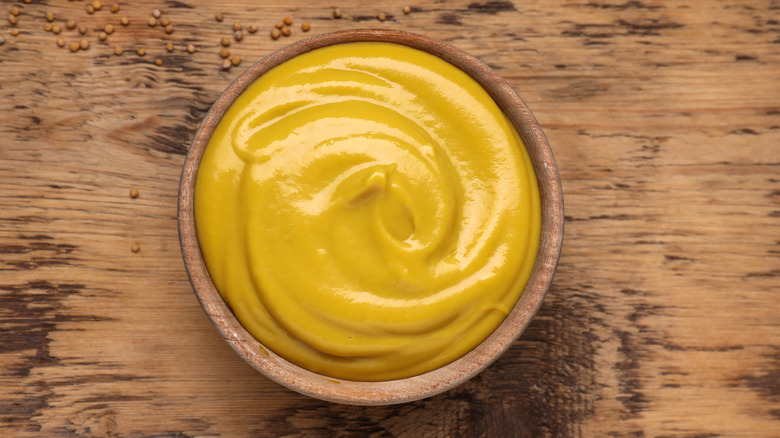Does Mustard Go Bad?
Mustard has earned its place among the condiments that will be loved throughout the ages, but the true mystery is, will it be as long-lasting as the love it endlessly receives? While mustard seems to have a reputation of immortality (it might be the only condiment on Earth that won't raise alarm bells if it's been sat at the back of the refrigerator for one, two, or even five years), the matter of mustard's expiration is still debated. The reality is, mustard does eventually go bad. The longevity of your mustard comes down to a range of factors such as the type of mustard, whether it is opened or unopened, where it's stored, and what it has come into contact with.
Since as little as a dollop of mustard can level up many dishes such as this sweet take on a cranberry mustard sauce or even a classic croque monsieur sandwich, knowing if your mustard is safe to eat and still flavorful is crucial for keeping things fresh. The idea of mustard never spoiling comes from the fact that mustard is more resistant than other condiments because of its high acidity levels, which are thought to prevent pathogen development. While most mustard recipes include ingredients that are able to survive for long stretches of time (such as vinegar and mustard seeds), mustard won't last forever, and it certainly won't taste the same as it did when first opened. This is because while ingredients such as vinegar are preservatives, their quality will still lessen over time, leaving you with more than a bad taste in your mouth.
The trick to longer-lasting mustard
Properly storing your mustard is the best way to ensure you get to enjoy long-lasting mustard that tastes brand new. According to AskUSDA, mustard can be refrigerated for up to 12 months after opening. This is useful to keep in mind regardless of the "use by date" shown on the jar, which the USDA states is indicative of quality rather than safety. Tightly sealing the lid after use and avoiding utensils that may contaminate the jar with food or bacteria (i.e., a huge culprit for gone-bad mustard) will also help you maintain your jar of mustard. It's best to regularly check your mustard for signs of spoilage, such as mold, discoloration, a clumpy texture, or an off-putting odor.
There are several types of mustards to choose from, and being aware of the best way to store them will also give you a head start in extending the lifespan of your favorite yellow sauce. Unopened yellow mustard is typically good to enjoy for up to two years after its printed "best by" date and can be popped in the refrigerator for a year once opened. Unopened Dijon mustard still tastes good after one to two years past the "use by date" and can be kept refrigerated for six to eight months once opened. Honey mustard lovers have about one to two years to lap up the mustard goodness of an unopened jar and then three to four months once opened.


